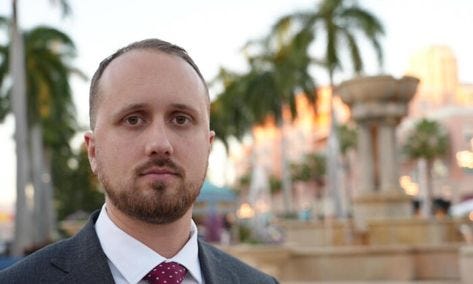Everyone has a right to speak their mind, but nobody has the right to be heard. In America our Constitution assures us that our government will not infringe upon this natural right. Some jurors since our founding have taken it upon themselves to find exceptions to this. The conviction of Douglass Mackey informs us of the ultimate consequences of compromising such a fundamental principle. If you want to be sickened by the extent to which the professional-managerial class has denuded American principles from the operation of our government, feel free to observe our Department of ‘Justice’ gloating over this ‘victory.’
If you’ve found your way here then you probably already grasp the true nature of this situation. It is simple: The ruling class will use any pretense available to justify the employment of the full coercive power of the state to silence opponents of the regime. What I would like to address is how the line between positive and negative freedom cuts through the center of the issue of free speech. A plain reading of the 1st amendment clearly describes a negative freedom:
Congress shall make no law respecting an establishment of religion, or prohibiting the free exercise thereof; or abridging the freedom of speech, or of the press; or the right of the people peaceably to assemble, and to petition the government for a redress of grievances.
If Congress can make no law abridging the freedom of speech, then the government is prohibited from using force in any way that curtails that freedom. In the case of Mackey, if it is true that his posting of memes on the internet violated some law, then that law must be unconstitutional. I believe the government is so enthusiastic about infringing upon Mackey’s negative freedom because it is in the name of positive freedom (if you consider voting as a form of speech).
What I’d really like to focus on here is that there can be no guarantee that anyone be heard in a free society. It is up to you to speak in a manner that people are willing, able, and interested to hear. It is this lack of positive freedom conferred by the coercive power of the state that is the natural price of freedom. Some people don’t like being confrontational. They have a difficult time disagreeing with the consensus. In a free society, such individuals will probably often feel ‘silenced’ or ‘oppressed.’ This is an unavoidable consequence of nature. If you attempt to use force to ‘correct’ this ‘injustice’ then you establish the very principle that ultimately leads to tyranny. As soon as you open the door to the idea that there is some government guaranteed positive right to speech, some right to be heard, then you must necessarily discard the negative freedom to which our laws and nature actually entitle us. What if I were to persuade someone not to vote? Should such arguments not be allowed? What if you harbor some irrational fear that voting is too dangerous for you unless the entire American populace is disarmed? Should we then discard 2A in favor of this new perverted conception of 1A? These are real examples of things that many people believe. Remember the definition of malinformation I highlighted in my first article here: Based on fact but used to… manipulate.
Compromise
The federal system in the United States provides us with some hope for compromise. At the level of the federal government exceptions to 1A should not be tolerated under any circumstances. Edge cases of speech currently not protected by 1A should instead be legislated state by state with the Supreme Court determining if any individual state signs into law something that is beyond the pale. With this system in place, there would be States in America with robust negative freedoms, but this isn’t the end of the story. In such places, community norms and values are desperately needed to fill the space that the government cannot fill without destroying the human spirit. Social conventions and courtesies can bridge the gap and provide organic support for the meek and inarticulate (with respect to speech). So long as direct coercion is not used, social pressure can be beneficial, and is indeed factored into the natural cost of freedom.1 The compromise is between monadic individualism and the total state.2
A social pressure campaign funded by taxpayer dollars is not acceptable, however. Any nexus to coercion makes the application of social pressure immoral and unethical, at least in my view.
As McConkey notes, the rhetoric of monadic individualism ultimately leaves individuals naked before State aggression. Only robust, organic community has the potential to resist the will of those who wield coercion to achieve their desired ends.




It seems that the ruling class violates the constitution and walks it back a step when they're caught and simply marches two steps forward as soon as people aren't looking. There needs to be consequences to malicious prosecutors and politicians who willingly break the constitution. I'd like to see laws that take politicians to trial for such crimes
Let's face the reality of the current situation... Our Constitutional guarantees have been attacked and eroded to the extent that soon we will have none.